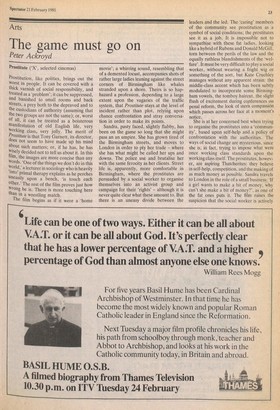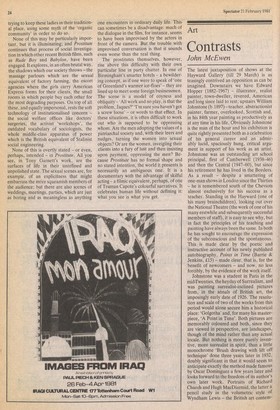Arts
The game must go on
Peter Ackroyd
Prostitute ('X', selected cinemas) Prostitution, like politics, brings out the worst in people. It can be covered with a thick varnish of social responsibility, and treated as a 'problem'; it can be suppressed, and banished to small rooms and back streets, a prey both to the depraved and to the custodians of authority (assuming that the two groups are not the same); or, worst of all, it can be treated as a boisterous manifestation of old English life, very working class, very jolly. The merit of Prostitute is that Tony Garnett, its director, does not seem to have made up his mind about such matters; or, if he has, he has wisely decided not to tell us about it. In this film, the images are more concise than any words. 'One of the things we don't do in this World,' a lecturer in sociology who is heavily into' primal therapy explains as he perches uneasily upon a bench, 'is touch each Other.' The rest of the film proves just how wrong he is. There is more touching here than in a wrestling match. The film begins as if it were a 'home movie'; a whirring sound, resembling that of a demented locust, accompanies shots of rather large ladies leaning against the street corners of Birmingham like whales stranded upon a shore. Theirs is so haphazard a profession, depending to a large extent upon the vagaries of the traffic system, that Prostitute stays at the level of incident rather than plot, relying upon chance confrontation and stray conversation in order to make its points.
Sandra, pasty faced, slightly flabby, has been on the game so long that she might pass an an umpire. She has grown tired of the Birmingham streets, and moves to London in order to ply her trade — where she has what might be called her ups and downs. The police use and brutalise her with the same ferocity as her clients. Street life is, apparently, more comfortable in Birmingham, where the prostitutes are persuaded by a social worker to organise themselves into an activist group and campaign for their 'rights' — although it is never quite clear what these amount to. But there is an uneasy divide between the leaders and the led. The 'caring' members of the community see prostitution as a symbol of social conditions; the prostitutes see it as a job. It is impossible not to sympathise with these fat ladies, looking like a hybrid of Rubens and Donald McGill, torn between the perils of the law and the equally ruthless blandishments of the 'welfare'. It must be very difficult to play a social worker, without wearing a fright wig or something of the sort, but Kate Cruchley manages without any apparent strain: the middle-class accent which has been subtly modulated to incorporate some Birmingham vowels, the tomboy haircut, the slight flush of excitement during conferences on penal reform, the look of stern compassiOn which passes across her face at a moment's notice.
She is at her concerned best when trying to organise the prostitutes into a 'community', based upon self-help and a policy of confrontation with the authorities. The ways of social change are mysterious, since she is; in fact, trying to impose what were once working class standards upon the working class itself. The prostitutes, however, are aspiring Thatcherites: they believe in self-help, competition, and the making of as much money as possible. Sandra travels to London in the role of a small business: 'If a girl wants to make a bit of money, why can't she make a bit of money?', as one of the fat ones puts it. The film raises the suspicion that the social worker is actively trying to keep these ladies in their traditional place, using some myth of the 'organic community' in order to do so.
None of this may be particularly important, but it is illuminating; and Prostitute continues that process of social investigation in which other recent British films, such as Rude Boy and Babylon, have been engaged. It explores, in an often brutal way, the shadows which our society throws — the massage parlours which are the sexual equivalent of factory farming, the escort agencies where the girls carry American Express forms for their clients, the small rooms in which people buy each other for the most degrading purposes. On top of all these, and equally impersonal, rests the soft technology of institutionalised concern — the social welfare offices like doctors' surgeries, the activist 'workshops', the outdated vocabulary of sociologists, the whole middle-class apparatus of power which is the British equivalent of Stalinist social engineering.
None of this is overtly stated — or even, perhaps, intended — in Prostitute. All you see, in Tony Garnett's work, are the surfaces of life in their unrefined and unpolished state. The sexual scenes are, for example, of an explicitness that might embarrass the more squeamish members of the audience; but there are also scenes of weddings, meetings, parties, which are just as boring and as meaningless as anything one encounters in ordinary daily life. This can sometimes he a disadvantage: much of the dialogue in the film, for instance, seems to have been improvised by the actors in front of the camera. But the trouble with improvised conversation is that it sounds even worse than the real thing.
The prostitutes themselves, however, rise above this difficulty with their own particular line in party chatter. In one of Birmingham's smarter hotels — a bewildering concept, as if one were to speak of 'one of Greenland's warmer ice-floes' — they are lined up to meet some foreign businessmen. The scene is a model of coyness and obliquity — 'All work and no play, is that the problem, Jaques?' I'm sure you haven't got a screw loose' — or words to that effect. In these situations, it is often difficult to work out who is supposed to be oppressing whom. Are the men adopting the values of a patriarchal society and, with their leers and nudges, turning the women into sexual objects? Or are the women, inveigling their clients into a fury of lust and then insisting upon payment, oppressing the men? Because Prostitute has no formal shape and no stated intention, the world it presents is necessarily an ambiguous one. It is a documentary with the advantage of skilful acting — a filmic equivalent, perhaps, of one of Truman Capote's colourful narratives. It celebrates human life without defining it: what you see is what you get.







































 Previous page
Previous page